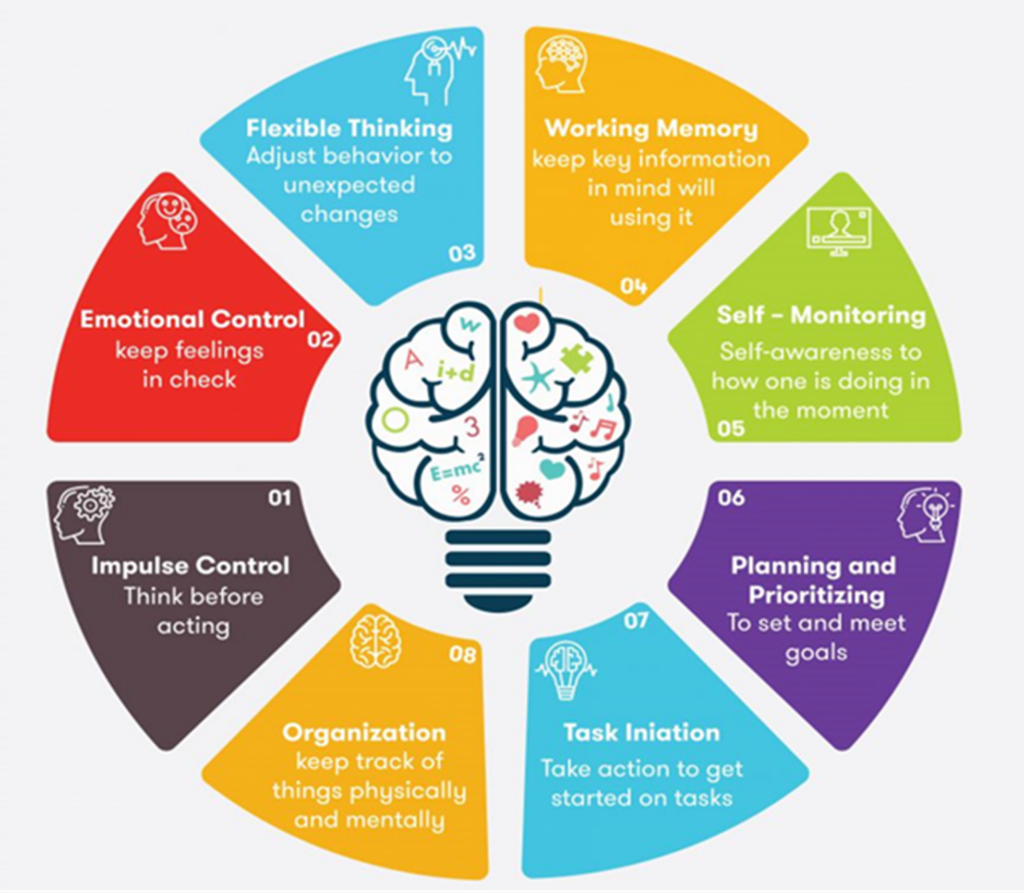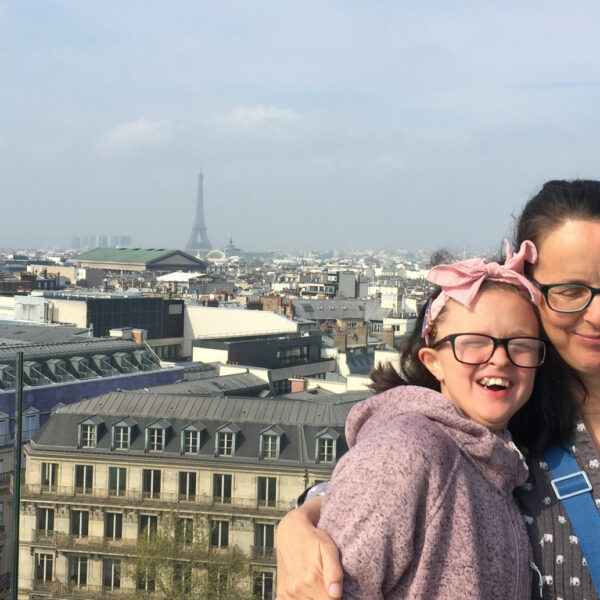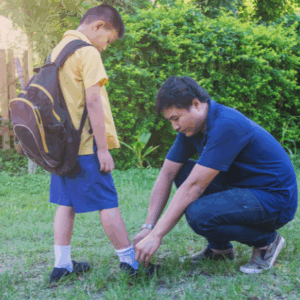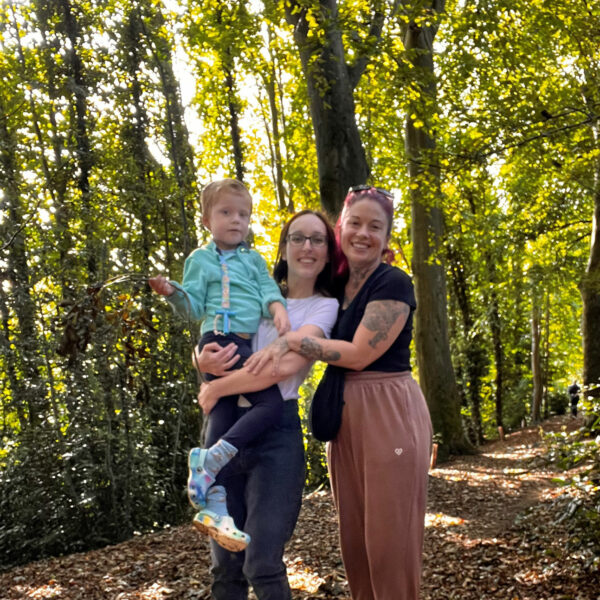Executive function
Information and signposting to help parent carers understand how learning and thinking differences affect executive function.
What is executive functioning?
Executive function describes the group of thinking skills we use to help us to navigate through life. We acquire these skills during childhood but we continue to develop them well into our twenties:
- impulse control – the ability to think before acting
- emotional control – keeping feelings in check
- flexible thinking – adjusting our response to unexpected changes
- working memory – keeping key information in mind as you are using it
- self-monitoring – having awareness of how you are doing in the moment
- planning and prioritising – the ability to set and meet goals in the right order
- task initiation – getting started with a new task
- organisation – keeping track of things physically and mentally

Neurodifferences and executive function
Many people with neurodevelopmental differences, such as autism and ADHD, also have differences in their thinking and learning, which may make some aspects of executive function easier and others harder. Executive functioning differences may also be present for children and young people with attachment needs too.
For example, someone might be able to focus very intently on a task that interests them – this is known as ‘hyper-focus’ – but find it harder to recognise how they are feeling and regulate their emotions.
Executive functioning can be variable depending on the circumstances, too. If a task really interests a child or young person it’s easier to get started and do it. On the other hand, if a task is really dull or they feel really tired it can be harder to get going.
Executive function can also change based on what’s happening around them. So, if someone is in a loud, busy environment it might be harder to keep their emotions in check or keep their attention on a task. For some children, it might be harder to control their impulsivity, so they might run off if they see something exciting, as the desire to see it overrules anything else.
Exploring executive functioning differences with your child can help you understand strengths and areas where they may need more support, particularly with their learning.
Supporting executive function
Professionals working with your child may suggest particular strategies that will be helpful to support their differences in executive functioning. Some of the most commonly used ones include:
- visual symbols, such as a ‘now and next’ board, calendars and lists can help people to understand what is happening and when
- voice recordings to remind people of upcoming tasks, events and deadlines
- organisational apps to help with managing anxiety and overload
- sequence cards, clocks and timers
- colour-coded materials and regular check-ins with staff at school to help manage their workload and prioritise homework tasks.
It’s important to remember that the strategies that people find most helpful will vary from person to person. For example, some people who struggle with planning and prioritisation may find that the suggested strategies make them feel more stressed and pressurised, so it is a case of trial and error to find out what works best for them.
If your child is experiencing differences in their learning and thinking and you are waiting for them to be assessed for a condition, or you are thinking of asking a GP or your child’s school to make a referral to start the process, you can access some support while you are waiting.
If your child is at school or nursery and staff have identified that they have special educational needs or may have a disability (SEND), they are entitled to get any extra support they need to make progress, whether they have a diagnosis or not. You can read more about getting SEN support in school and nursery in detail in our Education section. The Education section also contains information on support for children with medical conditions in school.
Services that can help
Amaze services
Amaze NDP Family Support is for parent carers with a child or young person who is at any point along the assessment pathway for a neurodevelopmental difference such as autism and ADHD. You can get advice and guidance right from when a problem is first flagged, through assessment, diagnosis (or otherwise) and beyond. We also run parent support groups across Brighton & Hove and East Sussex, some with a neurodevelopmental focus (see below).
For impartial information, advice and support on education, health, social care and disability related benefits, contact our SENDIASS advice line.
If your child or young person’s needs mean that they need much more care than other people of the same age, you might wish to consider applying for Disability Living Allowance for under 16s, or Personal Independence Payment for over 16s. You can apply, even if your child or young person does not have a diagnosis.
Other local services
BHISS Autism Support Team – Brighton & Hove Inclusion Support Service supports autistic children aged 4 to 16, and their teachers, in their educational setting. They also deliver autism workshops and training for parent carers, usually in school. Call 01273 293 481 or email [email protected]
East Sussex County Council CLASS+ service – support for families with autistic children including advice, coffee mornings, workshops and short-term support at home. Part of the county council Targeted Support CLASS service that gives specialist support to schools in East Sussex for 4 to 16 year olds with autism, communication and learning difficulties. Call 01273 336887 or visit the SEND East Sussex Facebook page for details of CLASS+ events.
For details of other local services, see your Local Offer. This is your local authority’s online listing of all the services and support that are available to families of children and young people with SEND in the area.
Support groups
Amaze runs parent support groups across Brighton & Hove and East Sussex, which you may find helpful to come along to. Some of these groups have a neurodevelopmental focus. If it is tricky to attend groups in person, we also have online groups that parents can join. Visit our parent groups and befriending page or see our calendar of events.
ADHD support group – informal support group for adults who have ADhttps://amazesussex.org.uk/face-2-face-groups/D or autism.
Brighton Pebbles – is a support group for parents and carers of children with any disability, especially those who find it difficult to access mainstream activities, for instance, those with severe autism or distressed behaviour. Visit their website or join their private Facebook group.
Further information
Online and printed resources
ADHD Aware – information and advice for parent carers, young people and adults and regular peer support groups that meet online.
The ADHD Foundation’s website has a section called Neurodiversity 101 which includes numerous articles and strategies to support children and young people with tasks such as getting ready for school, time management and organisation.
Organisational apps such as Brain in Hand can help to manage anxiety and overwhelm
The National Autistic Society has various resources to help with executive functioning such as organising and prioritising and dealing with change.
Understood is a US non-profit organisation supporting people with learning differences, which has useful resources and an app, Wunder, where you can connect to other parents and carers of people with learning and thinking differences.
Jessica Kingsley Publishers offers a several books on executive function.









